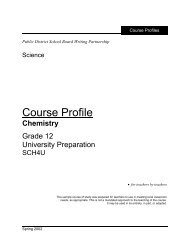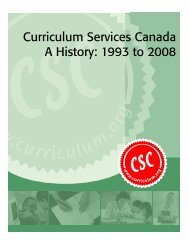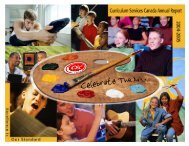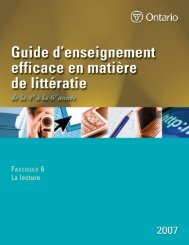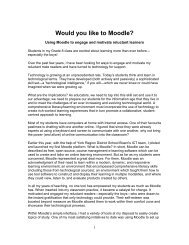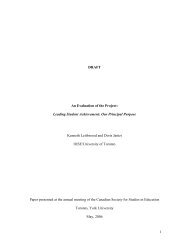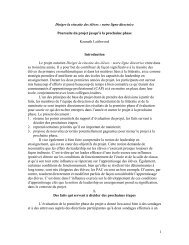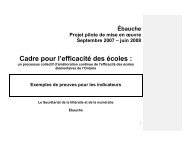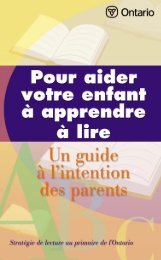Course Profile - Curriculum Services Canada
Course Profile - Curriculum Services Canada
Course Profile - Curriculum Services Canada
Create successful ePaper yourself
Turn your PDF publications into a flip-book with our unique Google optimized e-Paper software.
Activity 4: Rhetoric and Conventions of Writing<br />
Time: 120 minutes<br />
Description<br />
In this activity students are introduced to the concepts of rhetoric and conventions of writing as they apply<br />
in speeches. Students listen to excerpts from a few different speeches and subsequently deconstruct the<br />
speeches to determine what devices have been employed by the author. Students write their own speech,<br />
which may be delivered to the class or filed in their writing portfolio.<br />
Strand(s) and Expectations<br />
Ontario Catholic School Graduate Expectations:<br />
2a - listen actively and critically to understand and learn in light of gospel values;<br />
2e - use and integrate the Catholic faith tradition, in the critical analysis of the arts, media, technology,<br />
and information systems to enhance the quality of life;<br />
3d - make decisions in light of gospel values with an informed moral conscience.<br />
Strand(s): Literature and Reading Studies, Writing, Language, Media<br />
Overall Expectations:<br />
LIV.03B - identify and explain the effect of specific elements of style in a variety of literary and<br />
informational texts;<br />
WRV.02D - identify the literary and informational forms suited to various purposes and audiences and<br />
use the forms appropriately in their own writing, with an emphasis on supporting opinions or<br />
interpretations with specific information;<br />
WRV.03D - use a variety of organizational techniques to present ideas and supporting details logically<br />
and coherently in written work;<br />
LGV.01D - use knowledge of vocabulary and language conventions to speak, write, and read<br />
competently using a level of language appropriate to the purpose and audience;<br />
LGV.02B - use listening techniques and oral communication skills to participate in classroom<br />
discussions and more formal activities, such as storytelling, role playing, and reporting/presenting, for<br />
specific purposes and audiences;<br />
MDV.02D - use knowledge of a variety of media forms, purposes, and audiences to create media<br />
works and describe their intended effect.<br />
Specific Expectations:<br />
LI1.02D - select and read texts for different purposes, with an emphasis on recognizing the elements<br />
of literary genres and the organization of informational materials, collecting and assessing information,<br />
responding imaginatively, and exploring human experiences and values;<br />
LI1.04D - locate explicit information and ideas in texts to use in developing opinions and<br />
interpretations;<br />
LI3.01D - explain how authors use diction and phrasing to achieve particular effects in their writing;<br />
WR2.01D - demonstrate an understanding of literary and informational forms, such as myths, poems,<br />
short stories, scripts, advertisements, formal letters, reviews, and supported opinion essays, by<br />
selecting and using forms of writing appropriate to different purposes and audiences;<br />
WR3.05D - structure expository paragraphs using a topic sentence, supporting sentences to develop<br />
the topic, connecting words to link the sentences, and a concluding sentence;<br />
WR4.01B - revise drafts to ensure that ideas are adequately developed with supporting details, and to<br />
achieve clarity and unity;<br />
Unit 5 - Page 12<br />
•English - Academic



